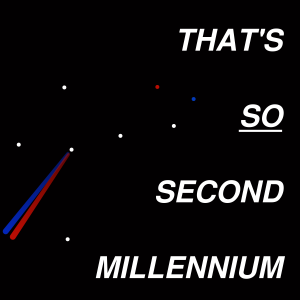Episodes

Friday Jan 11, 2019
CNAG: Law of Attraction
Friday Jan 11, 2019
Friday Jan 11, 2019
Let's do a really scary one.
Law of Attraction. So far as I can tell, this is a very, ummm, "results-oriented" take on the virtues of faith and hope. Jen Sincero circles around this a fair bit, not always calling it by that name. It involves picturing some situation, way of life, person, or thing that you really want in really vivid detail, surrounding yourself with pictures and other reminders of it, dressing and acting and talking as if it were already present and the way you want yourself to look and feel in that situation, and trusting that "Source Energy" or "the Universe" will "start pulling it in."
Another one of Jen's kind of terrifying phrases that really stuck in my head was "having a craft day with God." To be honest, I took it seriously enough that the other day I mashed it up with a suggestion from this little booklet on prayers and devotion to St. Joseph that I did the following:
- I found a holy card image of the boy Jesus and Joseph doing some carpentry (looking a lot more like a happy father and son team than anything in MY personal experience).
- I attached a list of five things I want to change about my life down the right side:
- Victory over addictive habits
- Greater sense of closeness to God
- Figuring out more what this "love" business is and actually doing some of it
- Focus, diligence, and peace in using my gifts
- Freedom to love instead of codependency
- I made this my desktop and laptop wallpaper.
Anecdotal evidence and all, but I'll let you know how it goes...
There are at least four possibilities here, which sound somewhat mutually exclusive, although as is usually the case in this marvelously intricate reality we inhabit, they really aren't.
1: This is hokum. The people who believe in the Law of Attraction are just the lucky ones. Random processes brought them enough of what they wanted, their confirmation bias kicked in, and now they trumpet their good fortune as if they actually did anything to cause it.
2: This is dressing up a very reasonable psychological effect as New Age mumbo-jumbo. If you focus yourself enough on something, and also think positive instead of looking for ways to self-sabotage, you'll capitalize on the actual opportunities that come up instead of tuning them out and making sure that the ones you see don't help you.
3: Sometimes this is actually black magic. There are demonic forces quite happy to divert you from God by showering you with enough wealth, sexual pleasure, power, or what have you and doing it in such a way that you can fool yourself into thinking that these things are being provided for you by a benevolent spirit.
Cathy Heller (whom by now I love dearly) and Jen Sincero have said a lot about money not being the root of all evil and having a negative set of attitudes about money. A great deal of what they say has to be true; I absolutely believe there is a sort of "starving artist complex" that keeps people from asking a reasonable fee or wage for what they do, and keeps them in crappy situations making those crappy wages, and that, further, this attitude is due in large part to a post-Christian, post-Marxist vague sense of the ickiness of wealth.
So far as I know, even the New Testament does not say "money is the root of all evil."
It does, however, say "the love of money is the root of all evil" (1 Timothy 6:10; see also Hebrews 13:5, and just basically listen to how this Jesus guy EVER talks about wealthy people in his parables).
4: Often this is actually more or less the case. Although obviously you run into difficulties believing that a good God will give you things that are actually bad for you, the aforementioned sort of hang-ups keep a lot of people from asking for the things that they actually legitimately want, things that Jesus of Nazareth actively assured us that his Father wants very much to give us.
Lord knows that I, personally, concluded as a boy that basically everything I wanted and longed for in life was something that God wanted me not to have. I can testify that that attitude got me exactly nowhere, certainly nowhere that involved anything I would recognize as virtue or holiness or loving people or helping them in any useful sort of way. I have been a miserable failure at a lot of things, probably precisely because I have been just straight miserable and convinced that every desire I ever had was evil.
I'm committing myself to experimenting with a very different approach for the other half of my life.
CNAG is the Catholic-New Age Glossary... not backed by Webster's or any other authority. These meditations are here on That's So Second Millennium because they are an attempt to find maximum harmony between different strands of psychology and spirituality as they are being explored and lived out in Western culture today. It flows from a respect for people's reasons for doing what they do and thinking what they think.

Monday Jan 07, 2019
Episode 041 - TSSM in 2019
Monday Jan 07, 2019
Monday Jan 07, 2019
Themes we'd like to grapple with in the Year of Our Lord, 2019, and beyond:
Last year was largely about the intellectual challenge leveled by many against religion, and we will continue talking about that as the podcast moves forward.
Paul's mission this year to work through Road to Reality
This year we also want to broaden the scope to include places where religion and faith converge, which means we're going to discuss psychology.
Looking forward to the SCS conference topic for this coming year: what it is, and has been, to be human. Neuroscience and what it implies for anthropology, and where it meets Catholic Christian anthropology coming the other way.
What is consciousness, anyway? What parts of the brain seem to be involved, and what do they do?
What is free will, anyway? Where are those breakpoints where the soul would have to affect the body in order for that to even work?
Crisis points in the way people in the post-Christian West approach the world.
Center for Ethics & Culture annual conference in 2018: Wilfred McClay & John Waters
"we care about everything, but without God... we have responsibility for everything, but we know that we are flawed and unable to provide solutions"
Post-Christian in this context includes both people who have explicitly renounced the Christian faith of the West and those who have a Christian identity in their back pocket somewhere but in reality are not relying on Jesus Christ or his teachings to guide their lives in any conscious way.
Christianity is a demanding religion. If you suck away all the grace and help it promises, but leave some of its demands for social justice or purity of intention, you have a recipe for constant internal condemnation.
Link:
Wilfred McClay (University of Oklahoma) on “Guilt in the Immanent Frame”, and John Waters on “The Importance of Not Being God: A Higher Power Is Indispensable for Human Beings and Human Societies”
No, not THAT John Waters.

Thursday Jan 03, 2019
A Catholic - New Age Glossary (CNAG)
Thursday Jan 03, 2019
Thursday Jan 03, 2019
So this business of being human is rather more difficult than it first appeared, isn't it? Have you found yourself feeling that way from time to time, perhaps increasingly so as you aged from childhood to youth to early adulthood?
Having a voracious hunger for information and insights, and a consuming fear of missing out on whatever the right answer actually is, I have wandered through many intellectual landscapes to at least see the sights and hopefully capture some sort of clue to living on the way through. Thomas Aquinas, among others, deserves some credit for this. When I had been prompted in his direction by Dante and John Ciardi (as I discussed here) and picked up the Summa Theologiae to read some articles at random, I was struck by the fastidious way in which he tried to give the maximum possible credit to every one of his wide range of sources.
I came away with the suspicion, not conscious in quite this many words at that early date, that probably every human being who has taken the time to write something down has thought something through far enough to merit my efforts to understand what they've said and digest it and incorporate as much of it as I can into my own worldview. I can at least note down that I think they are saying something essentially the same as items I already believe, and let them convince me to consider those items more closely. Maybe I've forgotten them, or never made enough of an effort to let them change my actual thoughts, words, and behaviors.
Two years ago, in January of 2017, I was on my way out of yet another temporary position in academia. I had books that I'd wanted to write for over 20 years, a journey to at least one edge of mathematics and physics that I'd allowed myself to give up on, and I had been working a Twelve Step program long enough to have gotten behaviorally sober but still feeling bereft of purpose. I was just getting into listening to podcasts, and I became a founding subscriber to Don't Keep Your Day Job (I feel like I ought to have a bumper sticker or a secret handshake or something).
That podcast covers a lot of ground, but one thing it has pushed in front of me is the contemporary phenomenon of sort of "New Agey" self-help practices. In particular, for whatever reason I felt moved to actually buy the book of one guest, Jen Sincero, with the memorable title You Are a Badass. This book is stuffed to the gills with hilarious woo-woo terminology like "raising your frequency" and Law of Attraction stuff and so forth. Of course, you can get it all kinds of other places, the vast majority of which I have not yet explored.
The thing about it is that I'm pretty sure there's something underneath all this weird cartoon spirituality, sometimes a murky distance below the surface, occasionally behind a piece of something I reject for very cogent reasons, but there is a substructure that makes sense to me. It might make sense to other people and enrich their lives if it weren't encoded in such an off-putting way.
Thus, another recurring feature for this year will be CNAG, my attempt at a Catholic - New Age Glossary, where I will take a term from this milieu and give you my best interpretation of it in Catholic Christian terms. Along the way I will point out some reasons why understanding that term and its usage might help us in our tired and underconfident contemporary Catholic culture to appreciate the significance of teachings we've forgotten, never bothered to learn, or are being called to understand in a new way given the strange new world we inhabit.
CNAG is the Catholic-New Age Glossary... not backed by Webster's or any other authority. These meditations are here on That's So Second Millennium because they are an attempt to find maximum harmony between different strands of psychology and spirituality as they are being explored and lived out in Western culture today. It flows from a respect for people's reasons for doing what they do and thinking what they think.

Saturday Dec 29, 2018
Why Do Westerners Really Think Science and Faith Are Opposed?
Saturday Dec 29, 2018
Saturday Dec 29, 2018
This is Paul. Welcome to the first regular blog post for That's So Second Millennium. For 2019 I'm going to be supplementing the podcast with a series of weekend blog posts.
Let's start out with this question: Can we hope to get a broad enough picture of why so many people in Western cultures think religion and science are unavoidably opposed to do justice to the reality?
Read the rest of this entry »
